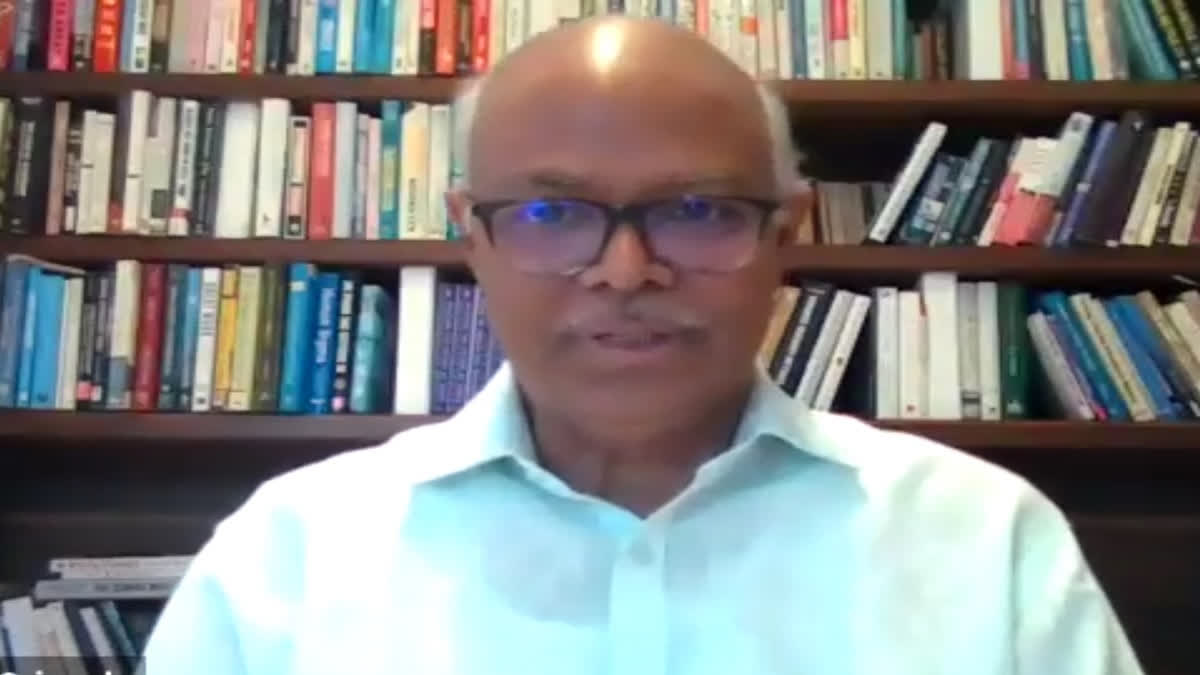New Delhi: In his latest book, Shaping the Future of Work, published by Penguin, Dr. Chandrasekhar Sripada examines why and how we need to rethink traditional work practices, organisational structures, and leadership styles.
He provides innovative ideas for engaging the next generation of workers and offers actionable strategies for making India’s job market more inclusive and future-ready. Dr. Sripada discusses how more flexible work arrangements can create job opportunities in rural areas, reduce city congestion, and support the growth of small towns.
In an exclusive interview with ETV Bharat, he also highlights the importance of developing a new work ecosystem that leverages technology and AI, while carefully managing these tools to prevent job losses.
ETV Bharat: What are the key trends shaping the job market in India right now, especially post-Budget? How do you see things changing?
Sripada: According to government data there has been an upward movement in non-farm jobs recently. In formal, organised and urban India, there are mixed trends. Well-known Job portal Naukri.com reported de-growth on BPO/ITES, Real Estate, Telecom etc. and growth in Insurance, Hospitality, Oil & gas etc. Seasonal trends apart, India, overall, has a serious jobs crisis on three key fronts: job creation, employability and equitable access to available jobs.
ETV Bharat: What do you think the future of work will look like in the coming years, given the rapid advancements in AI, ML, and digital technology, both globally and in India?
Sripada: The future of work will of course be driven and deeply altered by advances in AI, ML and robotics. While it is hoped that in the long run new jobs will be created, in the near term many jobs are being lost to new technologies, in areas such as IT/Software, Customer Care, Marketing, Finance, HR etc. AI/ML and generative AI are powerful tools for productivity improvement.
In turn, these make many jobs redundant and replaceable either due to the inability to up-skill or because machines are able to do what people are required to do. Talking about India, while the lure of the new age technologies exists, we have to be extra careful. Our economy has to create and sustain more jobs and not lose them to robots.
For example, think: will India be wise to adopt 'driverless' cars except where they have to go to hazardous places, when so many people could as well be employed as drivers? India has to 'shape' its own future of work – being more careful with technologies that kill jobs while staying open to those that enhance productivity.
ETV Bharat: How are people working globally, and how does India compare to the rest of the world in the post-COVID era?
Sripada: In many ways, India has shown great resilience in the face of the pandemic. With regards to approach to work, there has been greater adoption of remote and hybrid work in advanced Western nations than India. We have, largely, gone back to office work - refusing to learn any lessons from the pandemic. Many countries in Europe and other advanced nations such as Australia are avoiding burnout by legislating the "right to disconnect" after office hours. Of course, India is in a different development trajectory. However smart technology augmented work and productivity in general should be our focus. We should not equate long hours of physical presence with productivity. In India too, we must have more flexible work options, to unleash greater productivity across rural and urban India.
ETV Bharat: Do you think remote work, hybrid working, and work-from-home cultures will be successful in India, given that promoting these models might put many secondary and indirect jobs at risk?
Sripada: These flexible arrangements will not be successful on their own. We need to create an ecosystem to support remote work much like we did for office-based work. Yes when work moves away from urban concentrations some tertiary sector jobs like those in associated cafeterias and restaurants will suffer. But at the same time, these jobs will move to the small towns as well-paid jobs go to small towns via remote work. We need that reverse migration to develop rural economies on the one hand and decongest cities on the other. The benefits of remote work will outweigh the short-term losses.
ETV Bharat: Do you think our country is ready for this kind of experiment? If so: A) How long do you think it will sustain? and B) What benefits do you see from it?
Sripada: Yes, India needs the adoption of remote work at scale not mere experimentation. The experiment was already done during the COVID-19 times. We experienced it first-hand. Even now despite all the return to office mandates, a few lakh people are already working remotely from small towns. It is just don’t that we don’t talk about it since it challenges the views of the 'establishment'.
Just see how you are doing serious and productive work in the media by interviewing me and others by working remotely. Would you do any less if you moved to Jullunder, Motihari or Adilabad, instead of living in Mumbai, Gurgram or Hyderabad? It took 300 hundred years for offices to become our default understanding of work. It might take 30 years for remote work to be the new normal.
The benefits of remote and other flexible formats are many: First, it will create more inclusive employment opportunities for our rural youth. It will minimise the misery of migration. Since jobs with decent wages will come from small towns, the economies of small towns will grow. As people move away from big cities, they will be less congested, traffic will ease (imagine how it could change the lives of people in Bengaluru). Most importantly flexibility with time and space will provide much-needed autonomy to workers which will unleash their full potential. More women can join the workforce without the burden of commuting and unfriendly work hours.
ETV Bharat: Since job roles and their pace tend to change every decade or so, how do you see this trend evolving? Which new sectors do you think will be the biggest sources of job opportunities in the years ahead?
Sripada: In a country like India all sectors will grow. As they say, the rising tide lifts all boats. Education, healthcare, infrastructure, hospitality, retail. e-commerce, automobiles, leisure and luxury industry etc. are all likely to see sharp growth. But the shape of many jobs will change. Let me give some examples. Marketeers will finally get time to spend time with customers rather than mostly crunching data - which AI/ ML can do for them. Lawyers can be more nuanced about their understanding of a case than toiling hours to find case laws or drafting long legalese. Journalists can find more time to investigate as Chat GPT-type of tools will create ordinary content for them with much greater ease. Almost all professions will benefit from productivity enhancement tools. We need to learn new skills and new types of jobs to channel the newfound energy and time.
ETV Bharat: How can rural India contribute to job growth in the upcoming years and decades?
Sripada: Rural India, at least the small-town India that is all our tier-3 and tier-4 towns, are already the growth engines. A lot of talent is waiting there to be tapped. By moving offices, sites, and organised work in general to small towns, we will on the one hand take jobs to people (instead of moving people to jobs in cities) and on the other will accelerate rural spending through better distribution of purchasing power across hitherto neglected locations.
ETV Bharat: In India, how many people need reskilling and upskilling? Is there any data on this, and do people broadly take these issues seriously?
Sripada: There is no definitive data on this. But in all sectors, we will need reskilling and upskilling. Presently there is a lot of rhetoric around this. Real action on the ground is yet to pick up at scale.
ETV Bharat: Could a 4-day work week become a reality in India? What are the global trends on this topic, and considering India's challenges with job creation, how practical is this idea for the country?
Sripada: A four-day workweek will take a long time to come to India. But let's not think of this as a virtue. Such options make sense only if there is greater acceptance and adoption of overall flexibility in work arrangements. The four-day week is just another way to drive flexibility. This does not 'reduce' work - it just provides flexibility to work extra hours for four days and save three days of the week. So we should not get carried away by new shiny objects. We should imbibe the spirit behind them - which is 'flexibility'.
ETV Bharat: Which country is currently best prepared for the future of work, and how long might it take India to reach a similar level, given its job challenges and population size?
Sripada: No country is better in all aspects of the future of work. Take human-computer interface i.e. people co-working with robots seamlessly. It is a challenge for all countries including advanced countries. There are many aspects to the future of work. Some countries will catch up with a few waves earlier than others due to historical advantages. In the area of remote work - which is a distinct aspect of the future of work- India has a massive opportunity to 'leapfrog'. We can adapt and make it successful if we challenge our long-held and often unexamined beliefs around the virtues of 'presenteeism'.
ETV Bharat: When it comes to job satisfaction, is there a country that stands out as the best, even though all countries face their own challenges?
Sripada: Smaller countries like Denmark, New Zealand and Iceland etc. often report high job satisfaction. Job satisfaction is a very relative concept. Different people experience job satisfaction for different reasons at different times. Country-level comparison in this area does not make much sense. However, factors like autonomy, flexibility and decent living wages predict higher job satisfaction in all countries.



